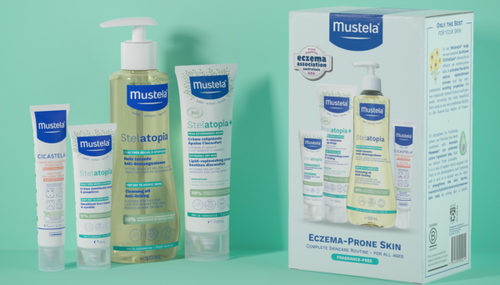Studying babies’ skin, from birth on
The different skin types
Normal skin

There's nothing quite like the soft, delicate skin of a baby. "Normal" refers to this idea of "baby skin": it is supple, soft and comfortable. Yet... it is more porous to external influences (pollution, bacteria, pollen) and is constantly dehydrated.
During its first two years, baby skin needs to be moisturised and protected on a daily basis.
Dry skin

Dry skin is dehydrated and contains fewer lipids than normal skin. As a result, it becomes rougher and finer and may peel or tingle, especially when exposed to harsh weather conditions, hot or cold air, etc.
Dry skin is easily relieved with daily care and attention.
Eczema-prone skin

Eczema affects 1 in 3 children in Australia today. It is a non-contagious chronic inflammatory skin condition that causes red, itchy patches on well-defined areas of the body and face.
These chronic flare-ups distinguish eczema-prone skin from normal skin types. They affect the baby's sleep and the whole family's quality of life.
But here's the good news: the symptoms can be controlled (the intensity and frequency of flare-ups can be reduced) with the right behaviour and care. These symptoms also decrease with age.
Very sensitive skin

A baby's very sensitive skin reacts instantly and temporarily to the slightest everyday stress, certain products or stimuli that would not cause irritation on normal skin. As a result, the skin reddens with a feeling of tightness, tingling or heat. However, very sensitive skin can be quickly soothed, no matter what part of the body is affected.
Many factors trigger reactions in very sensitive skin. Fragranced products should be avoided and to calm the irritation and redness, it is important to choose soothing products that protect the skin barrier.
Mustela has published 84 international scientific publications on skin and filed 14 patents.

An innovative reconstituted skin research methodology
Our teams have developed patented models of reconstructed baby skin at different ages - Stelaskin® - that mimic different skin types.
This innovation allows us to study different skin types in more detail, better understand the impact of specific skin exposures and evaluate and test all our products on these reconstituted skin models.













